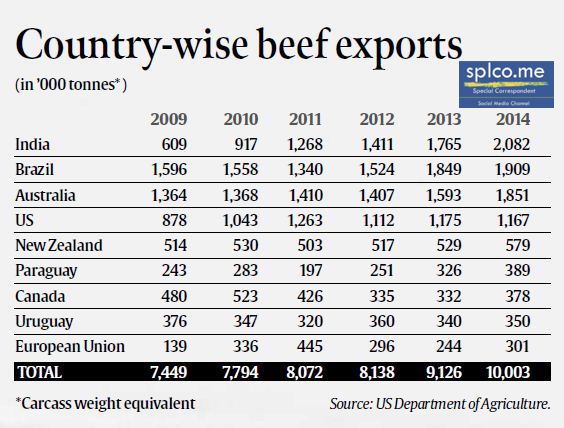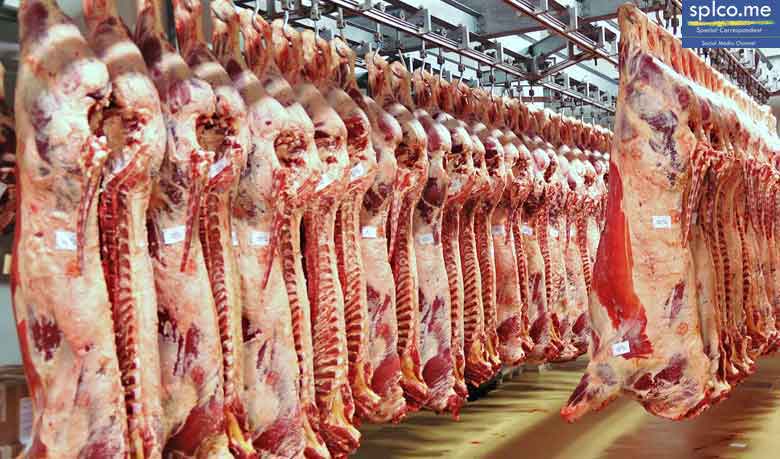According to an estimate, Delhi consumes around 40,000kg of buffalo meat and 80,000kg of mutton a day but due to short supply Delhi non vegetarians started feeling the heat.
Delhi doesn’t have livestock farms and relies on neighbouring Haryana, Punjab, Rajasthan and Uttar Pradesh. The bulk of buffalo supply to Ghazipur is from UP, which is country’s biggest meat producer.

Rs 15,000-cr industry that employs 25 lakh people in Uttar Pradesh started an indefinite strike on Monday to protest against the closure of illegal butcher shops and slaughterhouses. The crackdown was one of the first decisions taken by Yogi Adityanath, who took over as the UP chief minister on March 19 after the BJP swept the state election.
“Following the reports of closure of abattoirs, traders are not ready to send stock. They are scared of attacks on vehicles ferrying animals,” Asim Faraz, a commission agent in Ghazipur, said. As the stock was limited, prices were up Rs 40-60 per kilo, a meat shop owner in Sadar Bazaar said.
The wholesale price of a kilo of buffalo meat used to be around Rs 120. It climbed to Rs 175, Mohammad Suffian said. The shop price, too, had gone up -- from Rs 170 to Rs 200. In some areas, it even touched Rs 250, he said.
According to mutton traders, the wholesale price was up from Rs 380 to Rs 400. At some places mutton was sold for Rs 500 a kilo on Monday.
Traders at Ghazipur, Delhi’s only slaughter house and biggest wholesale meat market, said they were not getting cattle from Uttar Pradesh, the biggest suppliers of animals, which had led to buffalo and goat meat costing at least 25% more.
“Around 6,000 goats and 900 buffaloes were sold every day but in the last three days, not more than 2,500 goats and 400 buffaloes have been sold,” a trader said at Ghazipur, which borders Uttar Pradesh. He didn’t wish to be named, fearing a backlash from vigilante groups.
“The supply has decreased by 50% and has certainly led to rise in prices of beef and mutton,” said Sirajuddin Qureshi, who is the president of All India Jamiatul Quresh, a meat traders’ body.
The Aligarh-based Frigerio Conserva Allana Limited is one of the country’s biggest slaughterhouse-cum-meat processing units, contributing to a huge industry that provides livelihood to an estimated 25 lakh people directly or indirectly.
The shortage may not have an immediate impact as Navratras begin Tuesday. The demand for meat drops during the nine-day period considered auspicious by Hindus, many of whom stick to a vegetarian diet. Prices of pulses and vegetables could rise if the situation in UP was not resolved by the end of Navratras, said Qureshi, who is also the country’s leading meat exporters.
“We do not have any problem with illegal slaughter houses being shut down but what we are doing is per rules but our business too is suffering,” said another Ghazipur trader on condition of anonymity.
Following Uttar Pradesh government's action Jharkhand BJP government also on Monday asked closure of illegal abattoirs within 72 hours. The step was taken keeping in view the overall public order, safety and health of the general public, Principal Secretary (Home) S K G Rahate said in an official release.
Rahate also said that valid slaughter houses must ensure compliance of the rules and regulations laid down by the Animal Husbandry Department and Health Department.
your reviews / critics are valuable to us . your news making skills can also be jointly done in our novel unique social media news making platform kindly get in touch with our team who vows to bring news told in its pure kind from splco Social Media channel for deserved people.


Comments
Comment on this article: